Become a Member

Receive our quarterly magazine
Call 1300 300 182

Speak to a friendly and helpful voice
Make a Donation

Your donation will help us to fund the EAA

Maurice has decided to share his story on the occasion of his 60th birthday in the hope of raising much needed awareness for eczema sufferers and funds for the Eczema Association Inc. so that we can keep supporting our members like Maurice.
When I was a baby, I nearly died from eating an egg. My mother told me that I had a rash from head to toe. As that time, I had to wear gloves to bed so that I did not scratch myself to pieces.
This was the start of my eczema journey.

Whether it’s a mozzie bite or a minor allergic reaction, chances are you’ve been driven to the brink of insanity by a persistent itch before. For people living with eczema, that maddening itch can last for weeks at a time. But new research out of Harvard Medical School is showing promising signs of soothing this itch once and for all. - ABC Radio
Dr Kate DeAmbrosis is a Specialist Dermatologist with the Eczema Association of Australasia

Stories About Skin is a powerful new podcast series from the Spot Diagnosis Podcast team that explores the human side of skin conditions, combining compelling personal stories from patients with up-to-date expert insights and information from clinicians.
The first 2-part episode focuses on eczema, a common and chronic skin disease affecting up to 30% of children and 10% of adults to varying degrees.
Annie, who has been suffering with eczema for many years and Jenny, the mother of seven-year-old Atticus, who has been contending with severe eczema since the age of one, both share reflections on their respective illness journeys.
About the author - This book was created by a Melbourne mum who needed a way to explain to her young son and his friends about his severe eczema. After thoughtfully creating this resource, Butterfly Publishing and the Eczema Association of Australasia Inc are proud to launch The Eczema Detective. We hope you and your child feel empowered as you make new discoveries about your childs eczema. Perfect for home, childcare and preschool.

Wet wrapping is a bandaging system used to control the symptoms of eczema that can help to reduce the amount of itching and aids sleep. Wet wraps should be used on red, dry and itchy skin but should never be used on infected skin. Wet wrap therapy needs to be supervised by their therapy or health professional.
Read more on Wet Wrapping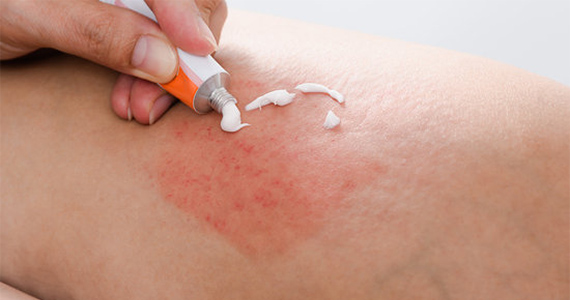
‘Topical’ means applied directly to the skin. ‘Steroids’ are a group of natural hormones, produced in the body by a variety of different glands. They are also produced synthetically as medicines and given as injections and in tablet form. Topical steroids act on the skin to reduce inflammation and speed up the healing of the skin and can reduce infection. They also help to make the skin less red, hot, itchy and sore. They are not, however, a cure for eczema.
Read more on Topical Steroids
Why do it? Many people carry bacteria called Staphylococcus aureus on their skin. This is particularly common in children and adults who suffer from eczema.
Eczema is an itchy skin condition, often worsened by a bacterial infection. Staphylococcus aureus can contribute to the flaring of the eczema and to ongoing skin inflammation. Complete eradication of Staphylococcus aureus in patients with eczema is very difficult, however some therapies can reduce the number of organisms which live on the skin.
Read more on Bleach Baths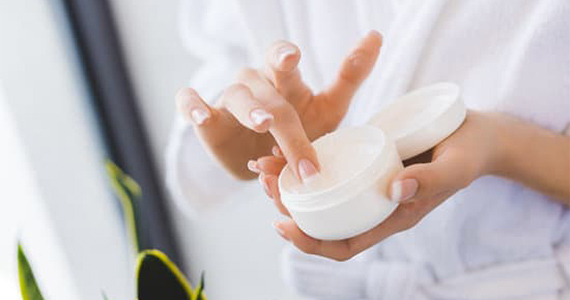
Moisturisers help protect the outermost layer of skin known as the stratum corneum or skin barrier. People living with eczema have a damaged skin barrier, which makes their skin more sensitive to irritants, allergens, bacteria and other invaders. A damaged skin barrier also makes it harder for the skin to retain water, leading to chronic dry, itchy skin, which can cause eczema and other skin conditions to flare-up or get worse.
Read more on Moisturisers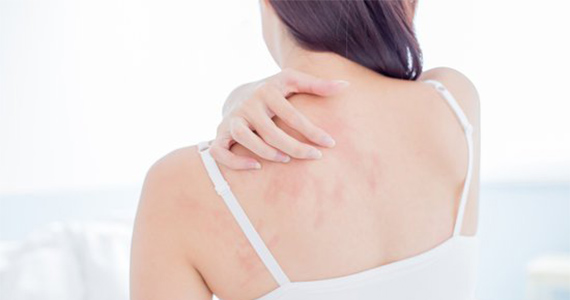
This publication from Professor Irwin McLean’s group, shows that lack of the protein filaggrin in the skin caused an inherited dry skin condition known as ichthyosis vulgaris that is strongly linked to the development of atopic eczema. More studies have confirmed this finding and at least 20 loss-of-function mutations (changes in a gene that prevent it working properly) causing filaggrin deficiency have been discovered in many different racial groups. Filaggrin deficiency has also been linked to more severe atopic eczema and to its persistence into adult life.
Read more on Dry Skin
One in eight children have eczema at one time or another as do one in twelve adults. Some of the latter are adults whose eczema has lingered on, while others will have eczema for the first time in adulthood. Some people will have had eczema for the first time as babies or young children and then experience several years of remission only to have the eczema re-appear suddenly and sometimes severely in their adult years. Since one of the homilies that seems to have attached itself to the condition is “you will grow out of it”, it is small wonder that adults with eczema become quite desperate.
Read more on Adults with eczema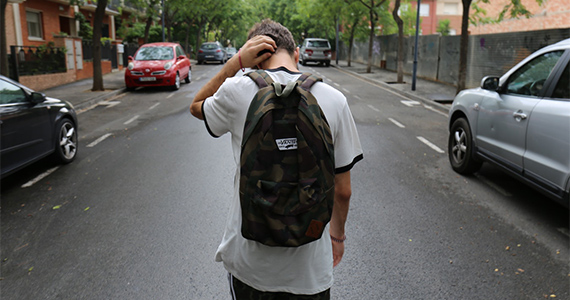
The teenage years can sometimes be the worst for people with eczema. This is not because the condition gets worse at this time: it can get better. As the skin gets greasier the eczema often improves and it is not uncommon for someone who has had eczema severely as a child to become much better at puberty while his non-eczematous friend discovers zits in a big way!
On the other hand, some people find that they have been free of eczema for a while only for it to come back in adolescence: others develop the condition for the first time during the teenage years. It is a very individual condition.
Read more on Teenagers with eczema
There are different skin disorders, some of which can start very early on in life, such as cradle cap. This thick scurfy scalp can appear soon after birth or when the baby is a few months old. It can develop suddenly. The scalp becomes coated with greasy yellow scales that stick to the head giving a crusty appearance. This scaliness can affect other parts of the baby’s face and head including the forehead, temples, eyebrows, behind the ears and in the neck folds. The skin underneath the scales may look sore, but it is not a condition that causes discomfort or itching.
Read more on Babies with eczema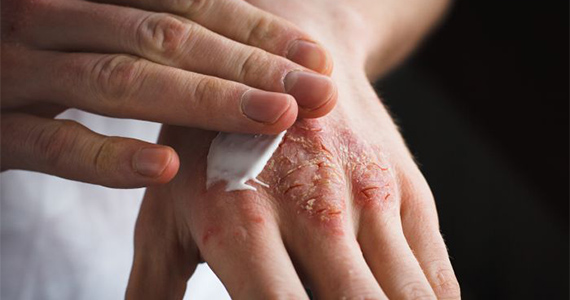
An explanation of the relationship between infection and eczema including causes and treatment. Skin affected by eczema tends to develop small cracks and fissures on the surface. This provides entry points for bacteria, which cause infection. Infection makes eczema worse and treatment more difficult. The skin can become more cracked which leads the way to further infection. Breaking this cycle of infection is the key to successful treatment. Both contact and atopic eczema may become infected in this way.
Read more on Infection and Eczema
Ear eczema can be an extremely irritating and, at times, painful condition. It can range from slight dryness of the pinna (the visible, projecting part of the ear) to extensive skin loss and soreness, as well as infection of the external and internal parts of the ear.
Eczema can affect the entire ear including the ear lobes, conchal bowl (the area outside the ear-hole), the ear opening (meatus), ear canal (also known as the external auditory canal – the part of the ear which leads to the ear drum) and the ear drum itself (also known as the tympanic membrane).
Read more on Ear Eczema
I joined the Eczema Association of Australasia after becoming desperate for an end to my itchy, red skin. I was first diagnosed with eczema around the age of 20 and prescribed a mild steroid cream for the rash on my chest. The rash cleared and the unfinished tube of cream sat idle in my bathroom cupboard for years. In my late twenties and thirties, I occasionally developed a small patch of dry skin, which I sometimes treated with a topical steroid cream or with a non‐steroidal emollient. It wasn’t until my early forties that my skin rash become problematic.
Read more on Red Skin SyndromeThe Eczema Association of Australasia Inc (EAA) collected responses for its Eczema Sufferer Survey over 25 years. The survey was conducted in pen and paper format and via online form.
Eczema is most commonly diagnosed at or soon after birth; 53% of surveys indicated that the condition was diagnosed between the ages of 0 - 6 months. A further 11% were diagnosed before their first birthday, meaning just under two-thirds of all eczema suffers are diagnosed between birth and 1 year of age.
A little over half current sufferers said that eczema moderately affect their daily life. With only 19% claiming to have no affect.
Just over half of eczema sufferers (52%) must also be conscious of environmental and physical triggers that worsen their condition. Of those whose condition is triggered, the weather is the biggest issue for them (72% of those whose condition is triggered). After weather, the biggest triggers for many are stress (57% of respondents mentioned), food (51%), soap (48%) and grass (36%). It is clear by the fact that many respondents chose multiple triggers, that for each individual there are a number of things to be conscious of and avoid.
A little over half of current sufferers describe their Eczema condition as Chronic. With just 6% claiming their condition is Controllable.